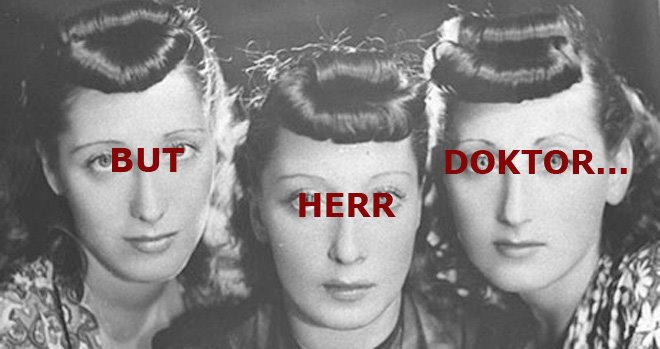These days, I can't even relax with a beer and enjoy some hot vampires without having to rip apart bodice ripping for its underlying sexual politics. America's moral crisis has found a platform in the recent spate of vampire inspired media, most notably in HBO's "True Blood" and the teeny bopper phantasmagoria of "Twilight." Vampires have traditionally served as a moralizing metaphor for the seductive danger of the sexually exotic, and both True Blood and Twilight exploit this fully, but to very different ends. Both borrow heavily from each other in terms of characterizing the psychological and practical difficulties of human-vampire inter-dating. Both equate fangs and boners in a hilarious visual pun. Both share the strange conception that "good" vampires dress like they are working in a trendy graphic design firm, while "bad" vampires dress like extras in some horrible pop-rock music video. But costuming aside, these two guilty pleasures speak to two very different audiences with very different politics.
"True Blood" creator Alan Ball has made a name for himself through the gen x existentialism of "American Beauty" and "Six Feet Under," through character driven plots about childish anti-heros trapped in the body of adults, who can't quite fit themselves into that suburban neighborhood, or that perfect nuclear family. His unspoken message has always been don't fit in, be true to your self and your journey, even if you end up looking like an asshole, hurting everyone you think you should love if you weren't so self involved, and (SPOILER ALERT) ultimately dying . With True Blood, Ball keeps the moral relativism but loses the heavy handed philosophical and psychological crises. True Blood is a cheesy, sexy fun fest which at its deepest level seems to be a promotion of what Bill O'Reilly might call "San Francisco Values." Set in the stylized, southern gothic town of Beau Temps, LA, the plot lines mostly revolve around the difficulties of social pariahs (vampires, psychics, shape shifters, gays, blacks) as they struggle for acceptance and equal rights, and against ignorance and intolerance. Along the way, there are a lot of vampire clichés exploited for knowing laughs, and, in true HBO style, a lot of very sexy scenes of people giving into their darkest desires. Ball seems to be writing to an audience like himself, who view the south as a code word for black magic superstitions and bigotry, who appreciate sex, drugs and alternative lifestyles, who get a chuckle out of ironic rehashes of vampire mythology.
In contrast, Twilight's weakness and strength is its sincerity. The plot line consists mostly of the two ethereally beautiful protagonists staring at each other while breathing heavily, both seemingly on the verge of puking. In this movie, the most evocative acting was done by the leads' cheekbones. There enough is enough painfully heartfelt romantic dialog to wet the day of the week panties of an army of tweenage true love waits tramplettes. (A personal favorite: "You're like a drug to me, my own personal brand of heroin.") but what there is absolutely NOT is sex. There is barely any physical contact. Sex is depicted in all forms as a dangerous threat, whether it be the threat of gang rape by a group of local rowdies, or the threat of your true love being so consumed by desire that he literally consumes you. The message was explicit. The final scene is Prom Night, the traditional cinematic site of a virgin's ravishment. Moody, awkward 17-year-old Bella begs her sulkily sultry date Edward to man up and turn her into a vampire already. He is tempted but begs her to reconsider, reminding her of all the love and pleasure they already share, with out the intrusion of this life-ending, deviant act. No one is missing the symbolism here.
Here is the danger as I see it: True Blood is fabulous, sexy, funny, scary, gory, and so is Twilight. But Allan Ball is preaching to the converted, an ironic snarky, liberal minded audience, while Twilight is speaking to the most susceptible audience there is: preteen girls. While there is nothing wrong in theory with 12 and 13 year olds being encouraged to not have sex, my concern is the larger cultural trend that this message represents. This kind of promise ring mentality once confined to the heartland is now seeping into all realms of media production, and is being passed off as light bubblegum media, not as serious ideological propaganda. I'm afraid that for this generation, there are no alternative message. Juno, the darling of alternative painfully ironic indie teens everywhere, was supposed to be so smart and witty, but she didn't even think to bring a condom to her preplanned seduction? For Juno, abortion was creepy icky and Plan B was a moot point. Good thing her family and boyfriend loved her more when she decided to keep the baby. Why is birth control in all forms the most taboo subject there is in teen entertainment, even in screenplays supposedly written by culturally savvy ex-strippers? If we have learned anything from Victorian sexuality, its that repressed desires will ultimately express themselves in the most dangerous and freakish of ways. It doesn't work people! Frankly, it freaks me out, and keeps me from enjoying even the most escapist of entertainment. It's like Handmaid's Tale here we come! I hope Obama addresses this issue soon. Until then, Jonas Brothers, I'm coming for YOU!
Subscribe to:
Post Comments (Atom)

1 comment:
I don't think that kind of promise ring mentality was ever confined to the heartland. This country's always been pretty puritanical, you've just been in sf too long. Now you're back in New York, which isn't the most promise ring wearing town either.. This essay rules.
-harlan
Post a Comment